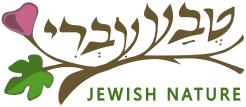Spring, Blessing and Plenty – Home reading on Birkat Ha'Ilanot for the Corona crisis
Birkat Ha'Ilanot (Blessing for the Blossoming Trees) is said from the beginning of the month of Nisan, come springtime, as the trees start blossoming. This reading material is ideal for learning under a flowering tree, and even at times when we have to stay home, we want to witness the blossoming from a distance.
· Let’s read the first source that will provide some background on the blessing and its meaning:
Birkat Ha'Ilanot / Shulchan Aruch 226:1
"If one goes outside during the month of Nisan and sees trees that are blossoming he recites a blessing:
Blessed are You, God, our Lord, King of the Universe, that His world is not lacking anything,
and He created in it good creations and good trees for the pleasure of mankind.
And He does not bless but once a year.
And if He dallied to bless only after they borne fruit, He shall bless no more."
Consider the meaning of this blessing:
What human pleasure does it speak of?
Why do you think the blessing is about the flowers blossoming and not the fruits?
How does the tree blossoming invoke the feeling that nothing is lacking in the world?
To what mental concept does the blessing direct us – how does it offer us?
Try to recount moments when you witnessed beauty that made you feel that "nothing else in the world is needed…"
· In addition to Birkat Ha'Ilanot, we also have contemporary prayers about the beauty of the world. One is Leah Goldberg's moving poem. Let's read it:
Teach Me, God / Leah Goldberg
Oh lord, my God please teach me how to bless and pray
For the ripening fruit and the withering leaf
For the freedom to breathe
And to sense and to see
And to know and to yearn, and even to fail
Teach me to sing the songs of your praise
For your rejuvenation of morning and night
So that each of my moments forever be new
So that I live no ordinary days
Let's look at the song:
What is the poet asking for? How does she want to experience her life?
Why do you think the praise is so important to the poet? Why isn’t the mere enjoyment of beauty enough for her?
How do you think one can preserve the sense of wonder in the face of creation in their daily life, even when, for example, we are confined to our homes?
· The confinement at home does not have to detach us from nature. An excerpt from Anne Frank's Diary can teach us a new perspective to encounters with nature:
From the diary of Anna Frank
"The best remedy for those who are afraid, lonely or unhappy is to go outside, somewhere where they can be quite alone with the heavens, nature and God. Because only then does one feel that all is as it should be and that God wishes to see people happy, amidst the simple beauty of nature. As longs as this exists, and it certainly always will, I know that then there will always be comfort for every sorrow, whatever the circumstances may be. And I firmly believe that nature brings solace in all troubles."
· Let’s look deeper into the text:
What is the "remedy" offered by Anne Frank for fear, loneliness or unhappiness?
Why is it called a "remedy"?
How can this remedy benefit our generation?
Consider how we can create such a healing encounter with nature while we are locked in our homes. Where do we encounter nature anyway?
Create a space inside your home that’s dedicated to the beauty of nature and stay there for 10 minutes. Try to do this whenever your heart needs the natural remedy.
If we are persistent and remain in touch with nature even when indoors, our exodus at the end of the quarantine period will surely bring us much closer to nature than we previously felt.
